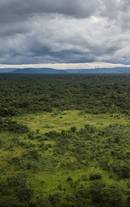Noticias
FAO to hold a series of technical virtual events on forest monitoring tools in West Africa
13/11/2020
13/11/2020

Recognizing the role of forests in combatting climate change, many African countries are implementing strategies to halt deforestation and manage their forest resources sustainably. For these countries, National Forest Monitoring Systems (NFMS) are essential, as they provide information necessary for application in creating national forest policies, planning and sustainable development. Forest monitoring systems enable measurement, reporting and verification (MRV) functions and aim to produce high-quality, reliable data on forests, including forest-carbon estimates, that are critical to the battle against climate change caused in part by deforestation and degradation of forests.
To support countries in Africa in implementing forest monitoring activities, FAO is...

The Central African Forest Initiative (CAFI) and the Food and Agriculture Organization of the United Nations (FAO) kicked-off a project aimed at the development of a standardized methodology, to assess drivers of deforestation and forest degradation in 6 countries in Central Africa.
Deforestation and forest degradation are complex transboundary processes with many direct as well as underlying causes. A good understanding of why and where forest disturbances occur is instrumental for the development of targeted policies and actions aiming to reduce the loss of forests and the associated carbon emissions.
However, the lack of updated data reflecting the recent trends on tree...
Join our webinar “Open and Transparent Forest Data: Innovation and Technology for Climate Action”
28/10/2020
28/10/2020

A key pillar of the Paris Agreement is the Enhanced Transparency Framework (ETF), which aims to raise ambitions for climate action through transparent country reporting. The development of National Forest Monitoring Systems (NFMS) with open and transparent data can enable action for forest and climate. In light of the climate emergency, it is time to scale up efforts toward accurate, open and transparent forest data, to catalyse higher ambitions under the Paris Agreement.
The new FAO webinar “Open and Transparent Forest data: Innovation and Technology for Climate Action” will highlight global and national efforts’ on forest monitoring that support the implementation...

Los inventarios forestales nacionales (NFI) son pilares fundamentales de los sistemas nacionales de monitoreo forestal (NFMS) multipropósito, ya que proporcionan información precisa sobre la extensión, distribución, composición y condición de los bosques y tierras boscosas, así como los cambios que se están produciendo en estas áreas a través del tiempo. La diversidad de especies, densidad de árboles, incremento y remoción de existencias en formación, biomasa y carbono se encuentran entre los principales atributos obtenidos de los NFI. Estos atributos son esenciales para medir indicadores sobre manejo forestal sostenible, biodiversidad, mitigación del cambio climático, y para desarrollar y monitorear políticas y...

Rocío Cóndor is an FAO Forestry Officer working on the Enhanced Transparency Framework and coordinating the GEF-funded Capacity-building Initiative for Transparency work related to the forest sector, known as CBIT-Forest. In an interview, she reflected on the ways solid data can inform good decisions when it comes to sustainable forest management.
What does your work entail?
I work at the Food and Agriculture Organization of the United Nations (FAO) where I support GEF-funded projects related to the Capacity-building Initiative for Transparency. This initiative helps developing countries track their progress toward meeting the Paris Agreement, with tools and training to report their greenhouse gas...

